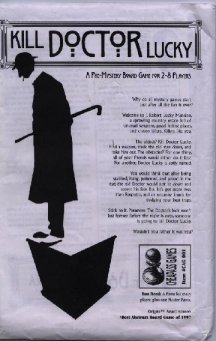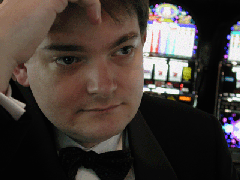|
A
Cheapass Interview with James Ernest
Designing
the best games you may not have heard of...yet...
|
|
|
One game
that helped deify Ernest.
|
James
Ernest may be the smartest guy in the world.
It's true. He designs the games that keep really smart people
up late playing. While most people associate board games with
Parker Bros. and card games with Magic: The Gathering, James
has been designing games under the Cheapass
Games label since the late 1990s. Many of his games, like
Kill Dr. Lucky, The Great Brain Robbery, and Diceland, have
won Origins Awards, the gaming version of the Oscar. In fact,
James has won or shared 9 Origins Awards since 1997. I was lucky
enough to get El Cheapo to answer a few of my serious gamer-geek
questions.
Chris
Garcia: You're the big name in small games. What's
it like being a god?
James
Earnest: The holiest of my followers flock to me biweekly
and smother me with gifts and praise. I walk among the lowly
from time to time dispensing my wisdom and patiently observing
their unworthy and selfish acts. The sun shines at my command
and flocks of nightingales sing me each night to my rest.
CG:
Alright…I've been a big fan since I stumbled across Before
I Kill You Mr. Bond. Ya'll were certainly one of the first
companies where you could get games for a reasonable price
and since then, there have been dozens of imitators. What
do you see happening next in the industry?
JE:
Next? Man, I wish I knew. Most entrepreneurs are lucky if
they can guess correctly once in their lives.
I can
tell you that right now, game retailers (the small kind) are
working on tighter budgets and carrying fewer evergreen products,
deciding instead to subsist on "frontlist" games:
games that are less than four months old. Their small budgets
stem from having loads of backstock they can't sell and won't
destroy: namely, a zillion d20 products. If one company were
(directly) responsible for all this d20 inventory, they might
make a deal with retail and take some of it back to ease the
problem. But it comes from everywhere, can't be returned,
and takes up space and money that should be used for product
that moves.
In the
short term I hope small retailers feel a surge of returning
business from the closing of the Wizards of the Coast chain.
If that's enough to make them healthy again, I'd be thrilled.
But it may just be a bump in the road to ruin, as brick-and-mortar
stores continue to lose business to online retailers. Few
hobby stores have the budget or the sense to provide their
customers with a truly meaningful reason to shop there.
Meanwhile,
I see a few signs that the gaming hobby may in fact be growing,
despite the tapering-off of the retail sector. Computer games
are stubbornly unable to replicate the tabletop gaming experience,
and more players are beginning to realize this. There's no
amount of
teck-mologee that can make sitting at your computer comparable
to, or easier than, playing with live opponents. If someone
could figure out how to take advantage of that they'd be rich.
I'm working on it.
CG:
The descriptions for Captain Park's Imaginary Polar Expedition
and U.S. Patent #1 were two of the most creative pieces of
fiction I read in 2002. Have you considered writing longer
form speculative fiction?
JE:
I actually like the short form. When I was in college I wrote
humor pieces that were about a page long. Any longer, and
the joke was old. I never imagined that running out of steam
would become an essential skill.
I do have
some longer stories kicking around, including a couple of
screenplays, a collection of short stories, and a book about
low-stakes poker. The poker book is the ultimate collection
of short stories, really; a million little sets of rules for
poker games, with one-page insets about strategy and rules.
Look for it next year in a discount bin near you.
CG:
Ah, so how do you feel about the recent Poker Explosion?
JE:
I think it's awesome. Poker is a really great game, which
has only lived in the shadows because it's gambling. It's
nice to see poker coming into the spotlight for a couple of
reasons, not the least of which is that the popularity of
poker tends to load the low-limit casino games with new players.
This makes it fun for the rest of us.
CG:
OK, it has to be asked: what games influenced you to design
the games you make? Nowadays, when it's game night at Casa
de Ernest, what games are on the table?
JE:
I'm really impressed with Puerto Rico; there are parts of
it that really bug me, but in general I think it's a solid
game. I got into game design when Magic: The Gathering came
out, and I learned a lot about deck construction from playing
that game. Not to mention concise rules writing.
I'm also
a huge fan of poker, a game where the rules are transparent
but the strategy is endless. The strategy may be endless in
Puerto Rico, but so are the rules.
CG:
How long into playtesting does it take to see if a game is
going to make it? Do you find it harder to balance the elements
of luck or the elements of strategy in a game? When in the
playtesting period do you know that a game is seriously in
need of balancing?
JE:
Hm. Tough questions.
Some games
are immediately good, some are immediately bad. Some games
(these are the worst kind) hang on the cusp of playability
for months.
|
|
|
Yes, yes,
very good, that.
|
Usually
I will stick with a game longer if I think the story is compelling.
If it's an abstract game, it either works or it doesn't, and
I move on. But with a game like Captain Park, I like the story
so much that I'll invest a couple of months getting the mechanics
right.
Sometimes
you don't have a choice, like when the project has a deadline.
In those cases, if one mechanic doesn't work, you have to
be willing to quickly scrap it and start over. This is why
a lot of designers hate working on schedules.
Balancing
the luck and balancing the strategy are the same thing: you
balance one against the other. Every game calls for a different
mix, but the rule of thumb is the longer the game, the less
luck should matter. In a game like poker, there's plenty of
short-term luck in one hand, which is fine, but in the long
term strategic play will usually win. FALLING can be incredibly
luck-driven (okay, bad example, there's actually strategy
and speed in that one) but One False Step for Mankind relies
much more on skill. FALLING is a 90-second game and One False
Step takes 3 hours: after 3 hours you don't want to feel like
you've had no control.
There
is a separate choice on strategy, which is setting the difficulty
level. If we play a game called "pick up the red coin"
there's obviously strategy, but it's not especially deep.
If you go first, you pick up the red coin. (Obviously this
would be better as a real-time game.) If we play a game called
"Chess" there's still theoretically an optimal strategy,
but calculating it is practically impossible. Both these games
have no luck, but the difficulty level is different. For a
two-year-old, Pick Up The Red Coin is a marvelous game, and
Chess is terrible. The reverse holds true for, say, a grad
student. I admit to falling somewhere in between. So it's
important to decide exactly how much thinky-think is appropriate
for your players. This is where a lot of beginning designers
fall short: they expect their players to be as attuned to
their game as they are, and require way too much thinking
of them. I know better; I try to write games where, despite
the fact that there is strategy, if everyone plays poorly
the game is still fun.
As far
as needing balance, there's no particular red flag except
the obvious ones. If people aren't enjoying the game, something's
wrong. If one player is rocketing ahead and no one can catch
him, something's wrong. If one of the components bursts into
flames, or someone dies, or the game is seized in a police
raid, more development may be appropriate.
CG: Are there any plans for a Kid Specific Cheapass
division producing games for 12 and unders?
JE:
Not for 12 and unders. However, we are looking at starting
a branch of educational games for grades 7 through 12. You'll
hear more about that if we ever get it off the ground.
CG:
You recently released The Man Between, a thirty minute Spy
short starring Anthony J. Gallela. Any plans for future films?
Is there a game tie-in coming? If there are plans for future
films, do you need a wise-cracking side-kick with curly hair?
JE:
Hm. Easy questions. Yes, no, and maybe; how much do you weigh?
CG:
I'm 220, but look two -fifteen. Anyhow, since every game company
website has a "We Don't Look at Submissions EVER!"
posted, how does someone break into the business?
JE:
Well, you start your own company, obviously. Actually, there's
a fantastic book about the hobby game business called The
Game Inventor's Guidebook, by Brian Tinsman (not to be
confused with the hilariously outdated Game Inventor's
Handbook by Steve Peek). Brian talks about how to get
your game ideas published, or (as a last resort) publish them
yourself, and how the game industry works.
The secret
to breaking into any industry, especially one as small as
ours, is meeting people. Work for a game company if you can,
not necessarily designing games, but possibly writing articles
or reviews, playtesting, helping at conventions, etc. Meet
the people who make the decisions and find out what they need
and how to get it to them. You don't really "break"
into the industry so much as "blend." Before you
know it, something you do well will become your job.
CG:
Finally, you've conquered the game world. You've made strides
towards the film world. James Earnest, what's next?
JE:
What's next is convincing people there's no "a"
in "Ernest," After that I think I'll prove that
black is white and get myself killed either at the next zebra
crossing (British edition) or pedestrian crossing (American
edition).
The Business of Gaming
gaming business
merchant of games
merchant cash info for your business
merchant cash advance
starting a gaming business
|








